
Watches are more than just timekeepers – they’re style statements, conversation starters, and often, treasured investments. When shopping for a new watch, you’ll inevitably face one crucial choice: automatic vs quartz. While both types serve the same fundamental purpose – telling time – they do so in fundamentally different ways, and that can affect price, maintenance, longevity, and user experience.
In this article, we’ll explore the core differences between automatic and quartz watches, break down their pros and cons, and help you decide which one fits your lifestyle (and budget) best. Plus, if you’re looking to compare prices across models and brands, we’ll point you in the right direction.
🔍 What’s the Real Difference?
At the heart of the automatic vs quartz debate lies the movement – the mechanism that powers the watch.
⚙️ Quartz Watches: Battery-Powered Precision
Quartz watches use a small battery that sends an electrical current through a tiny quartz crystal. This causes the crystal to vibrate at a very precise frequency (32,768 times per second), which is then converted into regular pulses that move the second hand.
Key traits of quartz watches:
- Powered by: Battery
- Timekeeping accuracy: Extremely precise (often ±15 seconds/month)
- Maintenance: Low – just replace the battery every 1–2 years
- Price range: Typically more affordable
- Ticking movement: Second hand ticks once per second
🌀 Automatic Watches: Mechanical Elegance
Automatic watches are a type of mechanical watch powered by the movement of your wrist. Inside is a mainspring that winds automatically as you move. This spring slowly unwinds to power the gears that move the hands.
Key traits of automatic watches:
- Powered by: Kinetic energy (wrist movement) + internal mainspring
- Timekeeping accuracy: Moderate (±5 to ±30 seconds/day)
- Maintenance: Regular servicing every 3–5 years
- Price range: Often more expensive (though entry-level models exist)
- Sweeping movement: Second hand moves smoothly in tiny increments
✅ Pros & Cons Breakdown
| Feature | Quartz | Automatic |
|---|---|---|
| Accuracy | ✅ Very high | ❌ Moderate |
| Maintenance | ✅ Low (just change battery) | ❌ Needs regular servicing |
| Power Source | ✅ Battery (reliable) | ❌ Must be worn or manually wound |
| Longevity | ❌ Limited by battery/electronics | ✅ Can last generations if maintained |
| Craftsmanship | ❌ Often machine-made | ✅ Often hand-assembled, intricate |
| Weight & Feel | ✅ Lightweight | ❌ Heavier (especially with metal case) |
| Price | ✅ Budget-friendly | ❌ Can be pricey |
| Style & Prestige | ❌ Practical, not flashy | ✅ Considered luxury or heirloom pieces |
💰 Price Comparison: What Can You Expect to Pay?
At [Your Price Comparison Website Name], we’ve analyzed hundreds of models across dozens of brands. Here’s a quick snapshot of what you can expect in different price brackets:
| Budget Range | Quartz Watches | Automatic Watches |
|---|---|---|
| Under £100 | Casio, Timex, Seiko 5 Quartz | Entry-level Seiko 5, Invicta Pro Diver |
| £100–£300 | Citizen Eco-Drive, Tissot, Bulova | Orient Bambino, Seiko Presage |
| £300–£1,000 | Swiss-made (Tissot, Longines, Certina) | Mid-tier Swiss automatics (Hamilton, Mido) |
| £1,000+ | High-end quartz (TAG Heuer Formula 1) | Luxury brands (Omega, Rolex, IWC) |
🧭 Which One Should You Choose?
Choosing between an automatic and a quartz watch depends on your needs, lifestyle, and appreciation for craftsmanship.
💼 Choose a Quartz Watch If You:
- Need ultra-accurate timekeeping
- Don’t want to fuss with winding or maintenance
- Want a lightweight daily driver
- Have a limited budget
- Prefer practical over traditional
👔 Choose an Automatic Watch If You:
- Love classic craftsmanship and mechanical engineering
- Want a “forever watch” that can be passed down
- Don’t mind occasional maintenance
- Prefer a smooth sweeping second hand
- View your watch as part of your personal style or identity
🧼 Maintenance Tips for Both Types
For Quartz:
- Replace the battery promptly when it dies to prevent leakage.
- Store in a dry, cool place.
- Occasionally check seals if water-resistant.
For Automatic:
- Wear regularly or invest in a watch winder.
- Service every 3–5 years by a professional watchmaker.
- Keep away from magnets, as they can affect accuracy.
🏁 Final Thoughts: It’s Not a Battle – It’s a Match
Ultimately, quartz and automatic watches aren’t enemies – they’re just different tools for different people. Some collectors wear both depending on the day. Whether you crave the precision of quartz or the soul of an automatic, your perfect match is out there.
Before you buy, make sure to use our price comparison feature to find the best value and avoid paying more than you need to.





